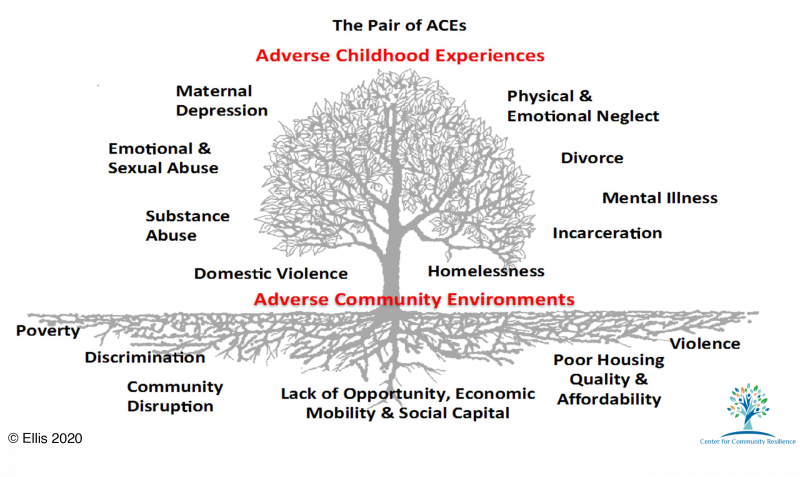Day 10 of 21
ADVERSE CHILDHOOD EXPERIENCES
In order to meet developmental milestones, learn, grow, and lead productive lives, children must be healthy.
Building social and emotional skills and strong mental health is key to children’s healthy development. Poverty, trauma, and inadequate treatment are proven to have a sustained, negative impact on this foundational framework in children.
Stressors external to the home, such as racism and discrimination, are community-level Adverse Childhood Experiences (ACEs) — incidents that have the potential to dramatically disrupt a child’s ability to thrive.
The original ACEs research was conducted in the 1990s by Kaiser Permanente. ACEs include 10 types of common traumatic experiences that may occur in childhood. They are organized into three categories: abuse, neglect, and household dysfunction.
In addition to experiencing trauma within systems and environments, children can undergo toxic stress that can change their genetic code, influencing how future generations respond to stress within their bodies and increasing their risk of poor health outcomes.
ACEs disproportionately impact children of color, according to the Child and Adolescent Health Measurement Initiative.
While trauma impacts all racial and socioeconomic groups, those that report higher rates of childhood trauma include adults of color, women, and people living in poverty.
In addition to addressing the systems and policies that negatively impact families, we can foster connections to help disrupt the long-term impact of trauma.

Image Source: Milken Institute School of Public Health
Learning Objectives
- Understand the basic concept of Adverse Childhood Experiences (ACEs).
- Recognize that trauma disproportionately affects people of color.
- Identify ways you and others in your community can help prevent childhood trauma.
Today's Activities
Choose one or more of these daily activities to learn about today’s topic. Plan to set aside 15 to 30 minutes to complete the activities and journal about your thoughts and feelings.

Take the ACES quiz from the American Society for Positive Care of Children to discover whether you experienced any adverse childhood experiences growing up.

Read “ACEs and Minorities” (6 min) from the Center for Child Counseling to learn how ACEs affect different populations.

Watch “We Can Prevent ACEs” (4:32) from the Centers for Disease Control and Prevention about the role communities can play in preventing and mitigating ACEs.

Capture what you learned by writing down your thoughts and feelings about today's content.
- What was your “aha moment” (moment of surprise or new information)?
- Does this information change your perspective?
- How will you use what you learned today to create more equitable spaces?
- How has trauma affected your own life?
- What is something you can do in your community, workplace, and/or personal life to affect change on this issue?
Download a free journal page for today.
Additional Resources & Activities
If you would like to dig deeper into this issue, check out these additional resources. We encourage you to revisit this material when you have more time. Feel free to come back to this topic as often as you’d like!
- Sign up for the Iowa ACEs Coalition newsletter to receive up-to-date research and education, as well as opportunities to learn and network with others working to respond to childhood trauma in our state.
- Read about seven steps you can take to address ACEs from the ACE Resource Network.
- Watch “Adverse Childhood Experiences (ACEs): Impact on brain, body and behavior” (6:02) from IHDCYH Talks.
- Watch the TEDx Talk “The Human Need for Belonging” (18:25) by Amelia Franck Meyer to understand more about the critical roles that connection and relationships play in our lives.
- Read “The Future of Healing: Shifting From Trauma Informed Care to Healing Centered Engagement” (15 min) by Shawn Ginwright, Ph.D., about a more holistic and culturally responsive approach to trauma.
- Read “Disrupting Toxic Stress in Children to Prevent Long-Term Health Impacts” (5 min) from the University of California San Francisco about an innovative health care model to screen and address toxic stress and trauma in children.
- Read “Healing Iowa,” a report by Iowa ACEs 360, to see data on the prevalence of ACEs in Iowa and to learn how ACEs impact Iowans’ health.
- Explore information on ACEs from the National Conference of State Legislatures to learn how ACEs impact different social systems.
- Screen the documentary “Resilience: The Biology of Stress and the Science of Hope” (1 hour) by James Redford.
Share your reflections on today’s topic on social media using the hashtag #IowaEquityChallenge.
Next Topic: Physical & Maternal Health

